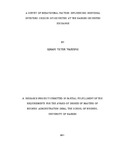| dc.description.abstract | Although finance has been studied for thousands of years, behavioral finance which considers the human behaviors in finance is quite a new area. Behavioral finance theories, which are based on the psychology, attempt to understand how emotions and cognitive errors influence individual investors‟ behaviors.
This study sought to determine the impact levels of behavioral influences on the individual investor choices of securities at NSE in the equity market. It was guided by one main objective seeking to determine the impact levels of behavioral influences on the individual investor choices of securities at NSE in the equity market. To meet the objectives of the study, a descriptive survey design was chosen. Primary data was collected using self-administered drop and pick questionnaires. The questionnaires were semi-structured having both open-ended and closed ended questions. It was based on the 100 individual investors selected from the twenty registered stock brokerage and investment banks. Cronbach‟s Alpha Test was used to test the internal consistency reliability of measurements, which are in formats of continuous variables 6-point Likert measurements. Factor analysis and descriptive analysis was used to analyze the data.
The study established that there are five behavioral factors affecting the investment decisions of individual investors at the Nairobi Securities Exchange: Herding, Market, Prospect, Overconfidence-gamble‟s fallacy, and Anchoring-availability bias.
Overconfidence and gambler‟s fallacy had higher impact on the decision making of individual investors. The market factor consists of three variables: price changes, market information, and past trends of stocks. The very high influences of market variables can be linked to the respondents‟ profiles, which show that most of them had not attended training about stocks. The prospect factor possesses three variables that have significant impacts on the investment decision making: loss aversion, regret aversion, and mental accounting. Loss aversion ranks as the variable having the highest impact on the decision making of the investors, thus investors tend to seek more risk after a prior gain and consequently after a loss, they tend to be more risk averse. The study concludes that there are five behavioural factors that highly impact the investment decisions of individual investors at the NSE. | en |

